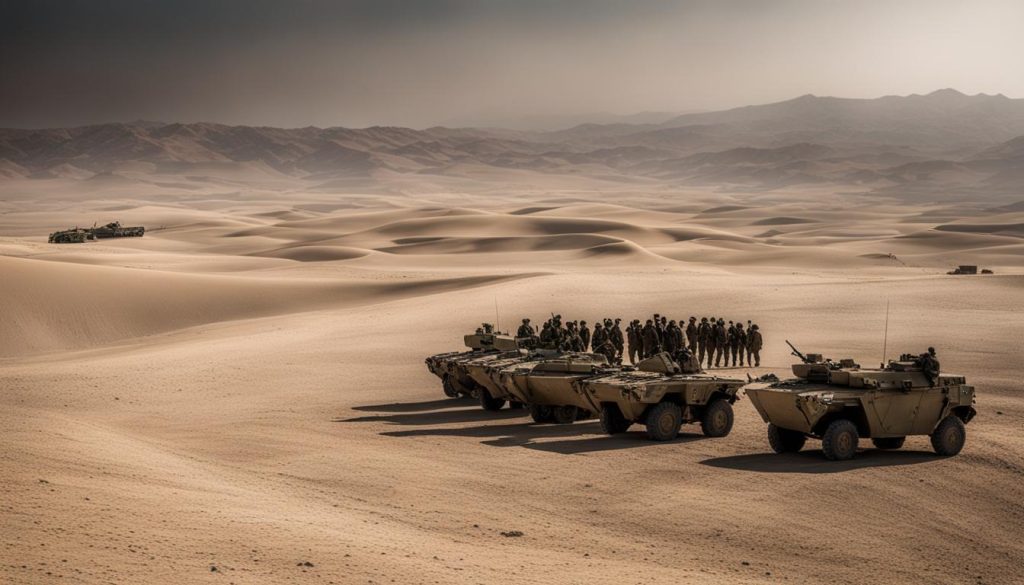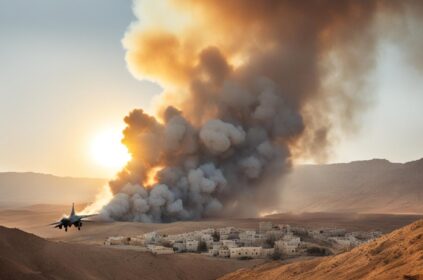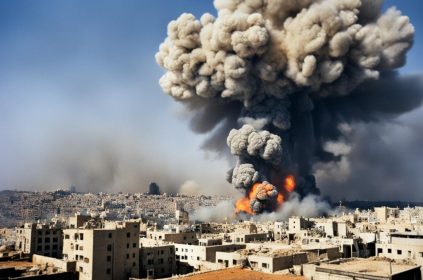The escalating conflict between Israel and Iran in the Middle East is leading to increased tensions and has the potential to impact various aspects of the global economy. The International Monetary Fund (IMF) has warned that a war between these two countries could result in higher oil prices, a reversal of the recent fall in inflation, and a negative impact on financial markets. The IMF is closely monitoring the situation and highlighting the risks of a broader conflict. Previous conflicts in the Middle East have led to significant increases in oil prices and geopolitical tensions, which could have far-reaching consequences.
Key Takeaways:
- The conflict between Israel and Iran is causing regional instability and geopolitical tensions.
- A war between Israel and Iran could lead to higher oil prices and a negative impact on financial markets.
- The International Monetary Fund (IMF) is closely monitoring the situation and warning of the risks of a broader conflict.
- Previous conflicts in the Middle East have resulted in significant increases in oil prices and geopolitical tensions.
- The ongoing conflict between Israel and Iran has the potential to impact the global economy.
Continue reading to learn more about the economic impact, financial markets reaction, and other key aspects of the Israel-Iran conflict.
IMF Warns of Economic Impact and Interest Rate Hike
The International Monetary Fund (IMF) has highlighted the potential economic consequences of the ongoing conflict between Israel and Iran. The IMF’s concerns extend to the impact on interest rates, financial markets, and inflation, among other factors.
Economic Impact and Interest Rates
The IMF warns that a broader conflict between Israel and Iran could lead to higher interest rates worldwide. Central banks may respond to increased inflation caused by higher energy prices resulting from the conflict. This response could have a negative effect on global economic activity, particularly in countries with weak growth already.
| Economic Factors | Impact |
|---|---|
| Inflation | A potential 0.7% increase due to a 15% rise in oil prices and increased shipping costs resulting from the conflict. |
| Business Confidence | Negatively affected by the heightened geopolitical tensions and uncertainty surrounding the conflict. |
| Investment | Potentially reduced as businesses become more cautious in the face of increased geopolitical risks. |
The IMF’s estimation of a 0.7% increase in inflation highlights the potential impact of the conflict on the prices of goods and services. As a result, the financial situation of individuals and businesses may be affected.
Financial Markets
The Israel-Iran conflict has already had an immediate effect on financial markets. Investors have exhibited increased anxiety, leading to a drop in share prices. In London, the FTSE 100 experienced its largest decline since July 2023, signaling a shift in market sentiment.
Market sentiment in financial markets is strongly influenced by geopolitical tensions. The ongoing conflict has underscored the vulnerability of markets to political and military developments, with potential consequences for investment portfolios and financial stability.
“The IMF warns of the potential economic impact of the Israel-Iran conflict, including higher interest rates and disruptions in financial markets.”
The IMF’s concerns about the economic impact and potential interest rate hike resulting from the Israel-Iran conflict highlight the need for deliberate policy actions and careful monitoring of financial markets. Governments and central banks must remain vigilant, implementing measures to mitigate risks and support economic stability.
Financial Markets React to Middle East Crisis
The escalating conflict between Israel and Iran has had immediate effects on financial markets. Market sentiment has been significantly impacted, particularly in London, where share prices have dropped amid growing anxiety over the Middle East crisis. Investors are concerned that central banks may delay interest rate cuts in response to the geopolitical tensions.
The London Stock Exchange’s key indicator, the FTSE 100, experienced its biggest drop since July 2023, reflecting the heightened market uncertainty and investor unease. Share prices have been heavily influenced by the potential outcomes of the conflict, and this reaction highlights the significant impact of geopolitical tensions on financial stability.
Impact on Market Sentiment
“The Middle East crisis has sparked significant concerns among investors, leading to a decline in share prices. The uncertainty surrounding the conflict and its potential consequences have created heightened market anxiety.”
Market sentiment plays a critical role in determining the direction of share prices and overall market performance. Investor sentiment has taken a hit as concerns over the stability of the region have grown. The conflict between Israel and Iran has introduced a new element of uncertainty, prompting investors to reassess their risk appetite and adjust their investment strategies.
Stock Markets and Share Prices
The conflict’s impact on share prices extends beyond London, with stock markets globally experiencing fluctuations in response to the geopolitical tensions. Share prices are closely linked to market sentiment, and any shift in investor confidence can result in significant price movements.
| Stock Market | Change in Share Prices |
|---|---|
| New York Stock Exchange | 0.75% decrease |
| Tokyo Stock Exchange | 1.2% decrease |
| Shanghai Stock Exchange | 0.5% decrease |
Investor Outlook and Financial Stability
The ongoing conflict has raised concerns about the overall stability of financial markets. Investor confidence and trust play a crucial role in maintaining market stability, and the uncertainties surrounding the Middle East crisis have the potential to disrupt this balance. Central banks and regulatory bodies are closely monitoring the situation to mitigate any potential risks and maintain financial stability.
Loss of Life in Gaza City Attack
In the midst of the ongoing conflict between Israel and Iran, Gaza City has experienced a tragic event resulting in the loss of lives. Recently, an Israeli army attack targeted a vehicle, leading to casualties that include both law enforcement officials tasked with protecting aid and innocent bystanders.
This distressing incident adds to the toll of casualties in the region and further exacerbates the tensions between Israel and Iran. The consequences of this attack highlight the gravity of the situation and the devastating impact it has on the lives of the people involved.
“The loss of life in Gaza City is a tragic reminder of the high stakes involved in the ongoing conflict between Israel and Iran. It underscores the urgent need for dialogue and de-escalation to prevent further casualties and devastation.”
The attack on law enforcement officials, who play a crucial role in protecting aid, is a stark reminder of the challenges faced on the ground and the risks inherent in the escalating conflict. It is imperative that all parties involved prioritize efforts to restore peace and prevent further loss of life.
To fully comprehend the impact of this incident and the broader conflict, it is necessary to understand the context of the events leading up to this tragic attack. The complexities surrounding the Israel-Iran tensions and their regional implications require careful analysis and international cooperation to mitigate the violence and find a lasting solution.
As the conflict continues, it is crucial to remember the human cost and strive for a peaceful resolution that brings an end to the suffering and loss of life in Gaza City and the wider region.
| City | Attack Type | Casualties |
|---|---|---|
| Gaza City | Israeli army attack | Law enforcement officials, bystanders |
Global Economic Risks and Sanctions
Treasury Secretary Janet Yellen has expressed concerns about the potential global economic risks stemming from the escalating tensions between Israel and Iran. She has emphasized the United States’ and its allies’ willingness to utilize economic sanctions as a means to address Iran’s “malign and destabilizing activities” in the region, underscoring the importance of employing economic tools to counter the impact of the conflict and ensure stability in the global economy.
| Treasury Secretary | Activities | Impact on Stability |
|---|---|---|
| Janet Yellen | Concerns over Iran’s activities | Preservation of global stability |
| United States and Allies | Utilization of economic sanctions | Addressing destabilization |
The Treasury Secretary’s remarks highlight the recognition within the international community that economic measures are crucial in countering the destabilizing effects of the conflict between Israel and Iran. By employing targeted economic sanctions, the United States and its allies aim to address Iran’s activities that threaten regional stability and global economic well-being.
In addition to preserving stability, utilizing economic tools and sanctions serves as a means to deter Iran’s malign behavior and curtail its support for various destabilizing activities in the region. Through targeted sanctions, countries hope to disrupt Iran’s financial resources, limiting its ability to carry out actions that further contribute to regional tensions and insecurity.
The ongoing conflict between Israel and Iran requires proactive measures to mitigate the potential economic fallout. By leveraging economic tools and implementing targeted sanctions, governments seek to uphold global stability and counter the destabilizing influence of Iran’s activities in the region.
However, it is crucial to carefully calibrate and harmonize these economic measures to ensure they do not inadvertently cause unintended consequences or exacerbate the already tense situation. Close coordination and communication among international actors are essential to navigating these complex challenges and minimizing the impact on the global economy.
Response and Escalation between Israel and Iran
As tensions continue to escalate between Israel and Iran, the war cabinet of Israel is convening to determine an appropriate response to the recent missile and drone attacks carried out by Iran. These attacks have further intensified the ongoing conflict, raising concerns about the potential for further escalation in the region.
The missile and drone attacks have presented Israel with a critical challenge, prompting careful consideration and deliberation. The war cabinet, consisting of high-ranking government officials and military leaders, is responsible for formulating a strategic response that takes into account the security of the nation and its citizens.
The situation remains extremely volatile, with both Israel and Iran engaging in retaliatory actions, fueling the cycle of violence and heightening tensions. This escalation has prompted world leaders to caution against further steps that could exacerbate the situation even more.
The impact of further escalation in the conflict cannot be understated. The Middle East region is already plagued by instability, and a spiral of violence could have devastating consequences not only for the countries directly involved but for the entire region and global peace. It is essential for all parties involved to exercise restraint and seek diplomatic solutions to prevent further escalation.
“It is in the best interest of all sides to avoid an escalation that would lead to disastrous consequences for the region and beyond. Dialogue and negotiation must be prioritized to ensure a peaceful resolution to the conflict.” – International Diplomatic Corps
In these critical times, diplomatic efforts, supported by the international community, need to be intensified. The use of effective dialogue channels and mediation may help to find a path towards de-escalation, which is vital for the stability and security of the Middle East.
Impact on Living Standards and Global Economy
The ongoing conflict between Israel and Iran is expected to have a significant impact on living standards and various aspects of the global economy, including growth, inflation, and employment. The World Economic Outlook report published by the International Monetary Fund (IMF) sheds light on the potential economic consequences of this conflict.
According to the report, high inflation resulting from the conflict is projected to hinder improvements in living standards for households in Britain for a second consecutive year. This indicates that the effects of the conflict are not limited to the regions directly involved but extend to global economic stability and individual well-being.
Economic Growth
The ongoing tensions between Israel and Iran have the potential to negatively impact global economic growth. Heightened uncertainties and geopolitical risks can disrupt business confidence and hinder investment, leading to a slowdown in economic activity. The IMF’s World Economic Outlook report urges policymakers to address these risks and take necessary measures to promote sustainable growth.
Inflation
As a result of the conflict, inflation is expected to rise, posing further challenges to the global economy. Higher oil prices and increased shipping costs due to the geopolitical tensions may contribute to increased inflationary pressures. Governments and central banks may need to respond by implementing appropriate policies to mitigate the effects of inflation and maintain price stability.
Employment
The Israel-Iran conflict can also have repercussions for employment rates around the world. Economic disruptions caused by heightened tensions can lead to reduced business activity and job losses. Policymakers and international institutions must prioritize policies that support job creation and minimize the adverse effects on employment levels.
It is crucial for global leaders and organizations to closely monitor the ongoing conflict and its economic implications. By implementing strategic measures and fostering international cooperation, it is possible to mitigate the adverse effects and work towards a more stable and prosperous global economy.
Continued Use of Economic Tools and Sanctions
Treasury Secretary Janet Yellen has reaffirmed the United States’ commitment to employing economic tools and sanctions as a means to counter Iran’s malign activities. The Treasury has already taken decisive action against various individuals and entities involved in terrorism and terrorist financing associated with the Iranian regime and its proxies. This unwavering stance aims to disrupt Iran’s destabilizing activities and uphold economic stability through targeted sanctions.
Efforts to Counter Iran’s Malign Activity
Recognizing the significant threat posed by Iran’s malign activity, the United States, led by the Treasury Department, has taken proactive measures to address these destabilizing actions. By imposing sanctions on key individuals and entities involved in supporting terrorism, the Treasury aims to disrupt the funding and networks enabling Iran’s aggressive behavior.
“We remain committed to countering Iran’s malign influence and will continue to use all available economic tools to disrupt their destabilizing activities.”
Through these targeted actions, the Treasury Department seeks to weaken Iran’s ability to finance and carry out its malicious agenda. By disrupting their networks and depleting their financial resources, the United States aims to curb Iran’s destabilizing activities and promote regional stability.
Sanctions as a Strategic Tool
Sanctions can be a powerful tool to deter and counter illicit activities, including those perpetrated by Iran. The United States, in coordination with its international partners, has implemented a range of targeted sanctions that aim to deter Iran’s support for terrorism, destabilizing regional actions, and illicit proliferation activities.
The Treasury Department’s work in identifying and designating individuals and entities involved in Iran’s malign activity is essential for enforcing sanctions. By imposing financial restrictions and consequences, these measures aim to change the cost-benefit calculus for those engaging in illicit activities and provide leverage for diplomatic negotiations.
Impact and Effectiveness
The continued use of economic tools and sanctions has shown promising results in curbing Iran’s destabilizing activities. By targeting key individuals, entities, and networks, the Treasury Department has disrupted the financial support system that enables Iran to carry out its agenda.
These measures have the potential to deter other countries and entities from engaging in similar activities, while also signaling the United States’ commitment to maintaining regional stability and countering Iran’s malign behavior.
Spring Meetings and Geopolitical Concerns

The spring meetings of the International Monetary Fund and World Bank are currently taking place amidst rising tensions between Israel and Iran. These meetings serve as important forums for global economic discussions and coordination, bringing together finance ministers, central bank governors, and policymakers from around the world.
The primary focus of these spring meetings is to address the potential economic consequences of the escalating conflict between Israel and Iran and its impact on global financial stability. The International Monetary Fund and World Bank recognize the need to assess the risks and formulate appropriate responses to mitigate the potential negative effects on the global economy.
Geopolitical concerns further elevate the importance of these discussions. Besides the Israel-Iran conflict, the ongoing tensions between Russia and Ukraine add an additional layer of complexity and uncertainty to the global landscape. The interconnectedness of these geopolitical challenges requires concerted efforts to address and manage the associated risks.
During the meetings, experts and policymakers will analyze the potential economic impacts of the conflict, including its implications for oil prices, trade flows, investment sentiment, and financial markets. They will also explore strategies to maintain stability and promote continued global growth in the face of these geopolitical uncertainties.
Key discussions and topics at the spring meetings:
- Assessing the economic consequences of the Israel-Iran conflict
- Evaluating the impact on oil prices and energy markets
- Analyzing potential disruptions to global supply chains and trade flows
- Addressing the implications for investor sentiment and financial markets
- Collaborating on strategies to reduce geopolitical risks and promote stability
“The spring meetings provide a crucial platform for global leaders to discuss the economic implications of geopolitical tensions and devise cooperative approaches to safeguard global financial stability.” – Finance Minister of a G20 country
Highlighting the importance of international cooperation:
The spring meetings emphasize the need for international cooperation and coordination to navigate the challenges posed by rising tensions and geopolitical concerns. In an increasingly interconnected world, the effects of conflicts and unrest in one region can reverberate across borders, affecting economies and livelihoods worldwide.
By fostering dialogue and cooperation among nations, these meetings provide an opportunity to develop coordinated responses that can mitigate the potential negative impacts of geopolitical tensions. Developing strategies to address threats to financial stability, promote sustainable growth, and ensure the resilience of the global financial system remains at the forefront of these discussions.
As the meetings progress, policymakers and key stakeholders will work collaboratively to identify effective measures and policy frameworks that can help mitigate the economic risks associated with geopolitical tensions. By fostering international solidarity and cooperation, they aim to enhance economic stability and promote a more resilient global economy.
Conclusion
The ongoing conflict between Israel and Iran has heightened tensions in the Middle East, and the global economy is at risk of significant impact. The International Monetary Fund (IMF) has issued warnings about potential economic spillovers, including higher oil prices and increased inflation resulting from this conflict. Financial markets have already shown signs of anxiety, reflecting the uncertainties surrounding this crisis.
As this situation continues to unfold, it is essential to monitor and address the geopolitical risks associated with the Israel-Iran conflict. The potential consequences could have far-reaching effects on global stability and economic growth. It is crucial for policymakers and international organizations to work together in mitigating these risks and finding peaceful resolutions to avoid further escalation and detrimental impacts on the global economy.
The Israel and Iran conflict is a clear reminder of the interconnectedness of global economies and the susceptibility of financial markets to geopolitical tensions. Efforts to maintain stability and minimize the adverse effects on the global economy should be prioritized. By addressing the root causes of the conflict and promoting dialogue and cooperation, the international community can contribute to a peaceful resolution and avert potential economic disruptions.
FAQ
What is the current conflict between Israel and Iran?
What are the potential economic consequences of the conflict?
How are financial markets reacting to the Middle East crisis?
Has there been any loss of life in the conflict?
How is the global community addressing the conflict?
What actions are being taken by Israel and Iran?
How will the conflict impact living standards and the global economy?
What is the approach of the United States and its allies?
What are the discussions at the Spring Meetings of the IMF and World Bank focusing on?
What is the overall impact of the Israel-Iran conflict?
FAQ
What is the current conflict between Israel and Iran?
What are the potential economic consequences of the conflict?
How are financial markets reacting to the Middle East crisis?
Has there been any loss of life in the conflict?
How is the global community addressing the conflict?
What actions are being taken by Israel and Iran?
How will the conflict impact living standards and the global economy?
What is the approach of the United States and its allies?
What are the discussions at the Spring Meetings of the IMF and World Bank focusing on?
What is the overall impact of the Israel-Iran conflict?
- https://www.aljazeera.com/news/liveblog/2024/4/16/israels-war-on-gaza-live-israel-vows-response-to-iran
- https://www.theguardian.com/business/2024/apr/16/middle-east-conflict-risks-a-sharp-rise-in-oil-prices-says-imf
- https://spectrumlocalnews.com/nys/central-ny/news/2024/04/16/yellen-iran-economy-sanctions
Israel vs Iran conflict Middle East tensions Nuclear proliferation
Last modified: April 16, 2024







